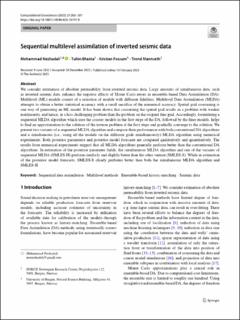Sequential multilevel assimilation of inverted seismic data
Journal article, Peer reviewed
Published version

Åpne
Permanent lenke
https://hdl.handle.net/11250/3073272Utgivelsesdato
2023Metadata
Vis full innførselSamlinger
- Department of Mathematics [939]
- Registrations from Cristin [9766]
Sammendrag
We consider estimation of absolute permeability from inverted seismic data. Large amounts of simultaneous data, such as inverted seismic data, enhance the negative effects of Monte Carlo errors in ensemble-based Data Assimilation (DA). Multilevel (ML) models consist of a selection of models with different fidelities. Multilevel Data Assimilation (MLDA) attempts to obtain a better statistical accuracy with a small sacrifice of the numerical accuracy. Spatial grid coarsening is one way of generating an ML model. It has been shown that coarsening the spatial grid results in a problem with weaker nonlinearity, and hence, in a less challenging problem than the problem on the original fine grid. Accordingly, formulating a sequential MLDA algorithm which uses the coarser models in the first steps of the DA, followed by the finer models, helps to find an approximation to the solution of the inverse problem at the first steps and gradually converge to the solution. We present two variants of a sequential MLDA algorithm and compare their performance with both conventional DA algorithms and a simultaneous (i.e., using all the models on the different grids simultaneously) MLDA algorithm using numerical experiments. Both posterior parameters and posterior model forecasts are compared qualitatively and quantitatively. The results from numerical experiments suggest that all MLDA algorithms generally perform better than the conventional DA algorithms. In estimation of the posterior parameter fields, the simultaneous MLDA algorithm and one of the variants of sequential MLDA (SMLES-H) perform similarly and slightly better than the other variant (SMLES-S). While in estimation of the posterior model forecasts, SMLES-S clearly performs better than both the simultaneous MLDA algorithm and SMLES-H.
